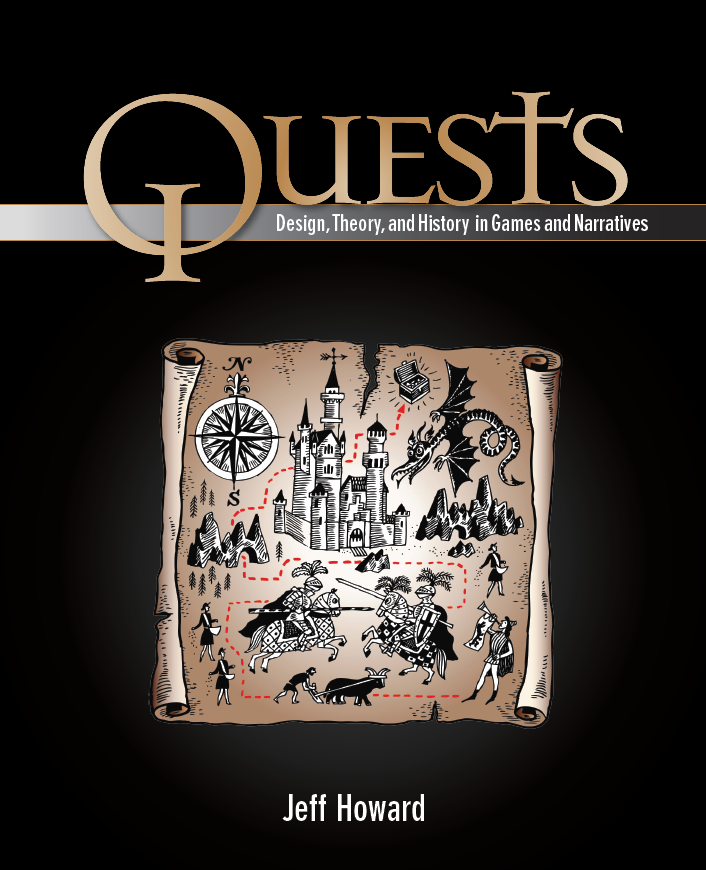Below is a list of reviews and mentions of Quests: Design, Theory, and History in Games and Narratives. They were graciously collected and excerpted in this format by my publisher, AK Peters.
Reviews
September 2008
Jeff Howard’s Quests: Design, Theory, and History in Games and Narrative is an exploration of … quests in both literary and gaming contexts, comparing and contrasting their appearances in each medium and striving to bring the two worlds closer together by imbuing game quests with more meaning. … I look forward to the dialog his book will inspire. He would have us re-examine the game quest in terms of the narrative quest, and apply those lessons to gaming. The book is well worth a read, both as a lesson plan for making the activity of questing more meaningful, as well as a first step towards giving games that rely heavily on quests—especially MMOS—more meaningful goals.
A reader at GoodReads.com:
“A must-have for every game designer or anyone who wants to understand questing in a more sophisticated way. This book has it all – mythology, Joseph Campbell, Carl Gustav Jung, some tutorials and a lot of wisdom  Another shining piece in my bookshelf.”
Another shining piece in my bookshelf.”
Included on the amazon.com list “Must Read Books for Aspiring Game Designers” by Sean M. Baity, Senior Designer at Electronic Arts
August 2008
If you’re doing work on role-playing games of any kind, or planning to teach a course [on RPGs] of your own, this is a great resource.
May 2008
“It’s an unusual book, but an illuminating one within these areas.”
May 2008
“According to Jeff Howard …, “a quest is a journey across a symbolic, fantastic landscape in which a protagonist or player collects objects and talks to characters in order to overcome challenges and achieve a meaningful goal.” The most important part of this definition comes at the end, as I believe the foundation of the quest journey is “to overcome challenges and achieve a meaningful goal.” Developing a successful quest means creating a meaningful interaction for the player.”
April 2008
“Certain scholars like Jeff Howard … and Matt Barton … have written rich, analytical, and well-annotated books on the subject, and I will use both in my course.”
March 2008
“This unique take on quests, incorporating literary and digital theory, provides an excellent resource for game developers. Focused on both the theory and practice of the four main aspects of quests (spaces, objects, actors, and challenges) each theoretical section is followed by a practical section that contains exercises using the Neverwinter Nights Aurora Toolset.” (Barnes & Noble)
February 2008
“Quests is an excellent tool for teachers … for teaching games, media, writing, or other areas that include theory and application. Many other books exist that are excellent for game studies classes and for game creation classes …, but Quests fills the particular niche of classes that often have titles like ”introduction to media studies,“ ”writing for new media,“ ”first (or second, or later) semester writing across the curriculum.“ Quests would also be an excellent choice as a supplemental text for more advanced classes, helping graduate students or faculty connect their research areas to new ways to represent, research, and teach using games.”
February 2008
“Jeff Howard’s Quests is an incisive and highly accessible book that leads the reader on an exploration of literature, computer games, and a connection between them.”
Daniel Erickson, Principal Lead Writer, BioWare Austin
February 2008
“Howard impressively handles bridging the gap between interactive fiction and classical literature with a thoroughly researched and well-argued treatise that focuses itself squarely on the two mediums’ connections and similarities.”
Nick Montfort, Assistant Professor of Digital Media, Massachusetts Institute of Technology
February 2008
“Jeff Howard’s Quests is an incisive and highly accessible book that leads the reader on an exploration of literature, computer games, and a connection between them. Howard includes valuable tutorials and exercises which draw on literary works, including Sir Gawain and the Green Knight, while also dealing with the specifics of how to use tools to create computer RPG modules. The book offers useful discussion of the history of adventure games and detailed analysis of quest elements using concepts from narrative theory, poetics, game studies, and other fields. Quests equips students and scholars as they journey onward to read, play, and fashion games and narratives.”
Dr. Susana Tosca, Associate Professor, IT University of Copenhagen
February 2008
Howard is a true Renaissance man in these electronic times. He merges his knowledge and love of literature with his enthusiasm for computer games and the unexplored possibilities of the new medium. Human intellectual activity has a common base, be it expressed in the form of poems or computer games, and Howard shows us some of the most stunning connections between the old form of quest literature and the new challenges of games.“
